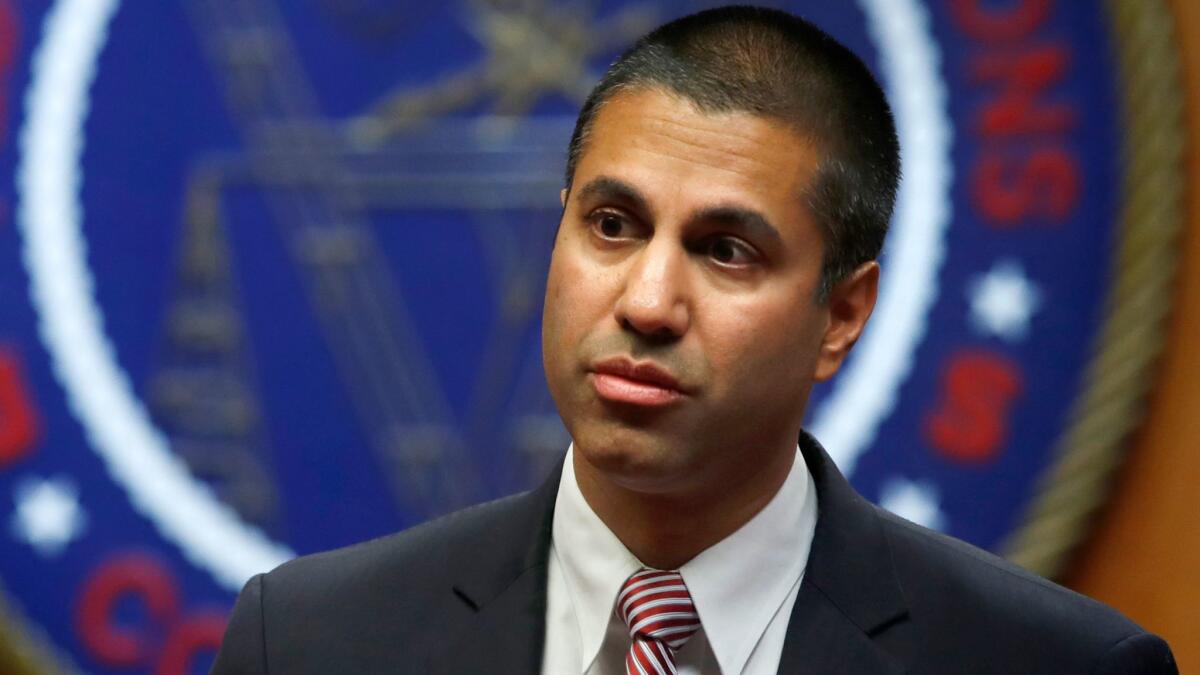You won’t lose internet service as coronavirus spreads. Here’s why
With millions of students and employees striving to work from home, the nation’s internet and telephone providers have pledged not to cut off service for customers for two months amid the coronavirus pandemic.
Last week, Federal Communications Commission Chairman Ajit Pai rallied the industry to accept his “Keep Americans Connected Pledge,” in recognition that millions of people will be reeling from a sudden loss of income and unable to pay some of their bills.
“I don’t want any American consumers experiencing hardships because of the pandemic to lose connectivity,” Pai said. “As the coronavirus outbreak spreads and causes a series of disruptions to the economic, educational, medical, and civic life of our country, it is imperative that Americans stay connected. Broadband will enable them to communicate with their loved ones and doctors, telework, ensure their children can engage in remote learning, and — importantly — take part in the ‘social distancing’ that will be so critical to limiting the spread of this novel coronavirus.”

Here are how major Internet companies are responding:
AT&T said it would drop data caps for its residential internet customers. The Dallas telecommunications giant also said it would not terminate any wireless, home phone or broadband residential or small-business service because of an inability to pay bills due to disruptions caused by the massive shut-down. AT&T said it would waive late-payment fees and keep Wi-Fi hotspots open for anyone — not just AT&T customers. AT&T also will continue its Access from AT&T program to provide internet access for qualifying low income households at $10 a month.
Charter Communications, which operates its cable TV, phone and internet service under the Spectrum brand, also agreed not to disconnect customers’ internet service for residential subscribers and small businesses experiencing economic hardship. It also will not assess late fees. The Stamford, Conn., company doesn’t impose data caps.
Charter also said it would offer free Spectrum broadband and Wi-Fi access for 60 days to households with K-12 and college students that don’t have Spectrum service. Charter said it would waive installation fees.
The company also will continue its existing program called Spectrum Internet Assist to provide service to low-income homes with school-aged children. And it will open its Wi-Fi hotspots across its footprint for all users. Charter is a major provider in Los Angeles.
Verizon Communications, the nation’s largest phone service provider, has been closing retail outlets. Last week, Basking Ridge, N.J., phone giant said it won’t cut off service and will waive late fees for residential and small business customers due to economic disruption related to the coronavirus.
Verizon said it would donate $10 million to nonprofits that support students and first-responder healthcare workers. Verizon also is providing increased data speeds for middle-school students taking part in its Verizon Innovation Learning program.
Cox Communications, which provides service to parts of Orange and Los Angeles counties, also said it would not disconnect service for 60 days for residential and small business customers who are unable to pay their bill due to the coronavirus disruption. The Atlanta company will waive late fees for customers dealing with economic hardship and open Cox Wi-Fi hotspots to those who do not have Cox service.
Residential customers with Starter, StraightUp Internet and Connect2Compete, which is designed for school-aged children who are enrolled in a low-income assistance program, will be automatically upgraded to speeds of 50 megabits per seconds.
Comcast Corp., the nation’s largest internet provider, said it would stop enforcing its data caps temporarily. For 60 days, its customers will have unlimited data.
The Philadelphia behemoth, which sells products under the Xfinity brand, also said it would not disconnect a customer’s internet service or assess late fees as long as customers “contact us and let us know that they can’t pay their bills,” the company said in a statement. It also is making its Internet Essentials $9.95 a month program for low-income families, available free for two months for new customers.
Other companies that signed onto Pai’s pledge not to disconnect customers for 60 days include CenturyLink, AlticeUSA, Google Fiber, Atlantic Broadband, Cable One, Granite Telecommunications, Pioneer Communications, and Farmers Telecommunications Cooperative.
On Monday, Pai announced modifications to FCC rules to make it easier for Americans who are deaf or have a speech disability to communicate using Telecommunications Relay Service. The modifications, which take effect immediately, are geared at enabling translators to work from home.
“This latest step — making regulatory adjustments to enable Americans with disabilities to continue to rely on telecommunications relay services — is an important component of our overall goal of ensuring that we Keep Americans Connected,” Pai said.
More to Read
Inside the business of entertainment
The Wide Shot brings you news, analysis and insights on everything from streaming wars to production — and what it all means for the future.
You may occasionally receive promotional content from the Los Angeles Times.










